Review: Savagely Funny and Ferociously Smart CLYBOURNE PARK Brilliantly Addresses Racial Discord
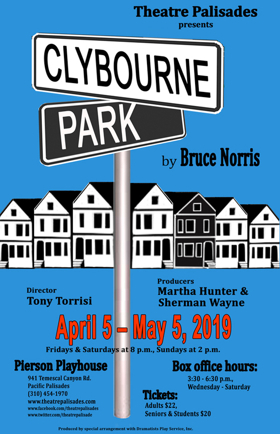
CLYBOURNE PARK is a savagely funny, ferociously smart, and brilliantly written play by Bruce Norris which won the 2011 Pulitzer Prize for Drama and the 2012 Tony Award for Best Play. Perhaps best known as a companion piece to Lorraine Hansberry's classic play A RAISIN IN THE RUN, an audience favorite that has been produced at theaters all over the world, Norris' play is set in the home purchased by Lena Younger in an all-white neighborhood of Chicago in Raisin although we never see the home during that play, However, in it we do meet Karl Linder, a representative from the Clybourne Park community association who attempted to convince the Youngers to NOT move into the home as he, as well as many others, believes racial integration would ruin property values for everyone else staying in the area.
CLYBOURNE PARK explodes in two biting and satiric acts, 50 years apart, with each of the seven cast members 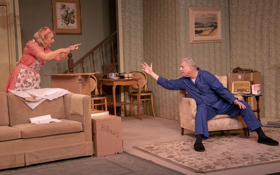 playing different characters in both acts taking place in this desired single-family home. Act I takes place in 1959 (as did Raisin) as the original home owners, Russ (Larry Thaler) and Bev (Yvonne Robertson) are packing up and preparing to move out of their Clybourne Park home where they raised their son. But now they are in a hurry to leave, selling it to Lena Younger below value in their attempt to get out as quickly as possible.
playing different characters in both acts taking place in this desired single-family home. Act I takes place in 1959 (as did Raisin) as the original home owners, Russ (Larry Thaler) and Bev (Yvonne Robertson) are packing up and preparing to move out of their Clybourne Park home where they raised their son. But now they are in a hurry to leave, selling it to Lena Younger below value in their attempt to get out as quickly as possible.
Among those visiting on 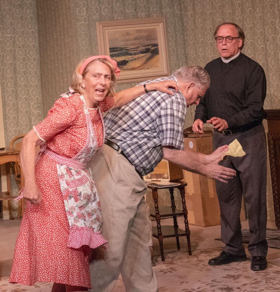 their final Saturday packing-up day is local pastor Jim (Philip Bartolf), who attempts to comfort Bev's confusion on how to deal with her husband's ever-increasingly irrational behavior. Robertson perfectly captures Bev's nervousness and total incomprehension of how to save her marriage without driving her husband to a heart attack. And it's very apparent that of all the characters, she is the most homespun and least educated.
their final Saturday packing-up day is local pastor Jim (Philip Bartolf), who attempts to comfort Bev's confusion on how to deal with her husband's ever-increasingly irrational behavior. Robertson perfectly captures Bev's nervousness and total incomprehension of how to save her marriage without driving her husband to a heart attack. And it's very apparent that of all the characters, she is the most homespun and least educated.
But before much can be done to alleviate Bev's fears, Karl Linder 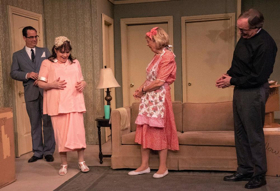 (Matt Landig whose characterization of this idiotic, racist man is brutally honest to the time period and environment in which Karl was raised) shows up with his pregnant, deaf wife Betsy (Laura Goldstein, who authentically does not react when things are said she should not be able to hear) to try to stop the sale of the middle-class home to the Youngers, an African American family, with whom Karl has already met unsuccessfully in Raisin.
(Matt Landig whose characterization of this idiotic, racist man is brutally honest to the time period and environment in which Karl was raised) shows up with his pregnant, deaf wife Betsy (Laura Goldstein, who authentically does not react when things are said she should not be able to hear) to try to stop the sale of the middle-class home to the Youngers, an African American family, with whom Karl has already met unsuccessfully in Raisin.
And all the while, their mostly clueless, racially-motivated comments and opinions about the situation, and life in general, are overheard by 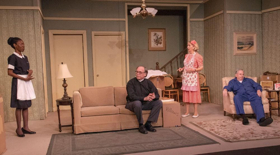 Russ and Bev's African American maid Francine (Ruthenna Porterfield, whose facial expressions express her disdain to a tee without having to utter a word), who is soon joined by her husband Albert (Brooks Darnell), an educated black man who finally decides to set the record straight by bringing in the hedged-upon topic of race into the conversation. Out of everyone in the play, these two characters represent the voice of reason, but would be shut out from expressing such radical ideas in public until years later when the Civil Rights Movement fought to bring racial equality into society.
Russ and Bev's African American maid Francine (Ruthenna Porterfield, whose facial expressions express her disdain to a tee without having to utter a word), who is soon joined by her husband Albert (Brooks Darnell), an educated black man who finally decides to set the record straight by bringing in the hedged-upon topic of race into the conversation. Out of everyone in the play, these two characters represent the voice of reason, but would be shut out from expressing such radical ideas in public until years later when the Civil Rights Movement fought to bring racial equality into society.
What remains hidden, until Karl chooses to inflict overwhelming emotional pain 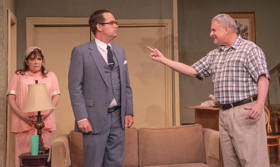 by mentioning it in one of his final arguments with Russ, is that Russ and Bev's son committed suicide in the house. And of course Karl knows that is why Russ wants out of the house as soon as possible, no matter the financial loss. The grieving parents have become shunned by their neighbors due to their son's crimes during the Korean War, so the two are ready to get away and re-start their own lives. Even learning their house has been sold to an African-American family does not change Russ' mind and he stands his ground, with Thaler's red-faced, realistic and overly confrontational screaming ending the act as he throws Karl out of the house. Poor Bev is left to deal with her irrational husband and accept a move she wishes she did not have to make.
by mentioning it in one of his final arguments with Russ, is that Russ and Bev's son committed suicide in the house. And of course Karl knows that is why Russ wants out of the house as soon as possible, no matter the financial loss. The grieving parents have become shunned by their neighbors due to their son's crimes during the Korean War, so the two are ready to get away and re-start their own lives. Even learning their house has been sold to an African-American family does not change Russ' mind and he stands his ground, with Thaler's red-faced, realistic and overly confrontational screaming ending the act as he throws Karl out of the house. Poor Bev is left to deal with her irrational husband and accept a move she wishes she did not have to make.
Act II jumps to 2009, taking place in the same house, now in a terrible state of disrepair and covered with graffiti. 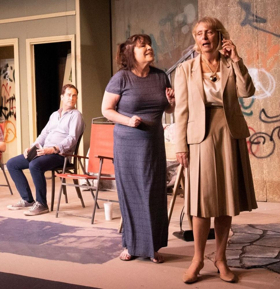 During this time, the Clybourne Park neighborhood has become predominantly African-American as now seems to be dealing with urban renewal due to its desired location close to downtown Chicago. The opposition to the new owners' re-development plans is with Lena Younger's great-niece Lena (Porterfield) who played in the home as a child and wants it, and the neighborhood small-family-home environment, maintained for its historic value. Along with her husband Kevin (Darnell, again the voice of reason), they are battling against the purchase and proposed building of a multi-story, modern family home on the lot by a young Caucasian couple, Steve and Lindsay (Landig and Goldstein), who are expecting their first child.
During this time, the Clybourne Park neighborhood has become predominantly African-American as now seems to be dealing with urban renewal due to its desired location close to downtown Chicago. The opposition to the new owners' re-development plans is with Lena Younger's great-niece Lena (Porterfield) who played in the home as a child and wants it, and the neighborhood small-family-home environment, maintained for its historic value. Along with her husband Kevin (Darnell, again the voice of reason), they are battling against the purchase and proposed building of a multi-story, modern family home on the lot by a young Caucasian couple, Steve and Lindsay (Landig and Goldstein), who are expecting their first child.
Battling it out for both sides are their lawyers, again mostly clueless on the real underlying problems, 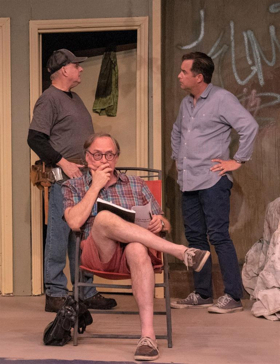 portrayed by Robertson as Kathy and Bartolf as Tom. But what happens to the sale when it is revealed a suicide took place in the home, a fact that was never revealed to Lena Younger when the home was sold to her? And just wait until construction worker Dan (Thaler) digs something up in the yard which ties the two acts together while breaking your heart.
portrayed by Robertson as Kathy and Bartolf as Tom. But what happens to the sale when it is revealed a suicide took place in the home, a fact that was never revealed to Lena Younger when the home was sold to her? And just wait until construction worker Dan (Thaler) digs something up in the yard which ties the two acts together while breaking your heart.
Kudos to all the actors and directors Tony Torrisi and Sherman Wayne for keeping attention focused on the dialogue without reverting into just a bunch of talking heads. Susan Stangl's sound design includes songs from both periods in time to set the mood, as do costumes designed by June Lissandrella. I do think Sherman's Wayne's set design needs to include several more packing boxes in Act I to reflect the "catastrophe" Jim refers to when he enters, and that the set change into Act II would be fun to watch if the curtain remained open.
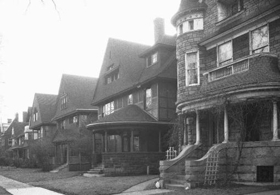
At left: a typical Clybourne Park street in the 1950s
Please note this topical, insightful, and relevant play about racial discord, civic engagement, and foibles of miscommunication contains adult situations and language, and is not recommended for children.
I do guarantee you will both laugh and shake your head at the stupidity being expressed, with Norris' dialogue engaging the audience from start to finish. No doubt as different generations see the play, their own upbringing in history's ever-changing times will impact the biting truths about equality still being fought for today on many levels. And those discussions will continue as long as CLYBOURNE PARK is brought to stages worldwide.
Performances continue through Sunday, May 5 on Friday and Saturdays at 8pm, Sundays at 2pm, by Theatre Palisades at the Pierson Playhouse, 941 Temescal Cyn. Rd., Pacific Palisades 90272. General admission tickets are $22 and $20 for Seniors and Students. Please contact the Box Office to make your reservations. (310) 454-1970. More information and tickets available at http://www.theatrepalisades.org/ Free onsite parking.
Photo credit: Joy Daunis
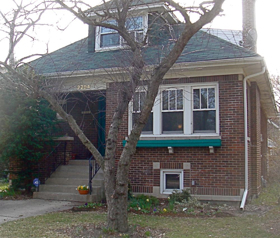 At left: A typical single-family home in Clybourne Park during the 1950s.
At left: A typical single-family home in Clybourne Park during the 1950s.
It is easy to image the disrepair it could have fallen into in 2009.
Reader Reviews

Videos
